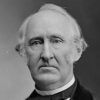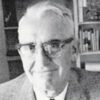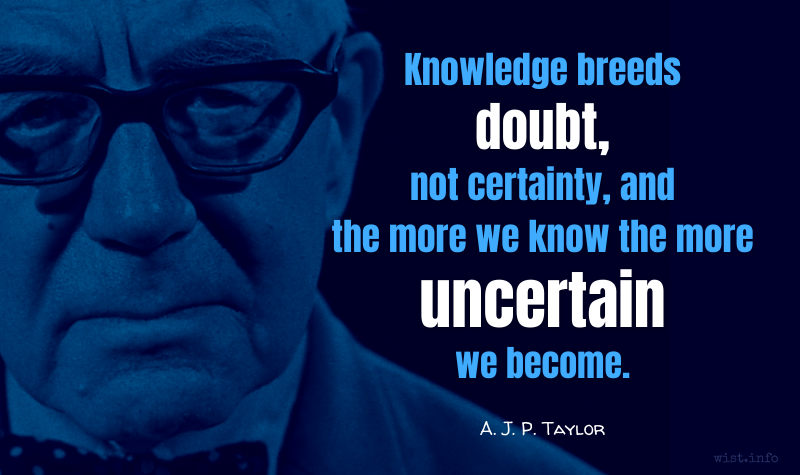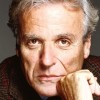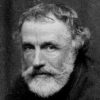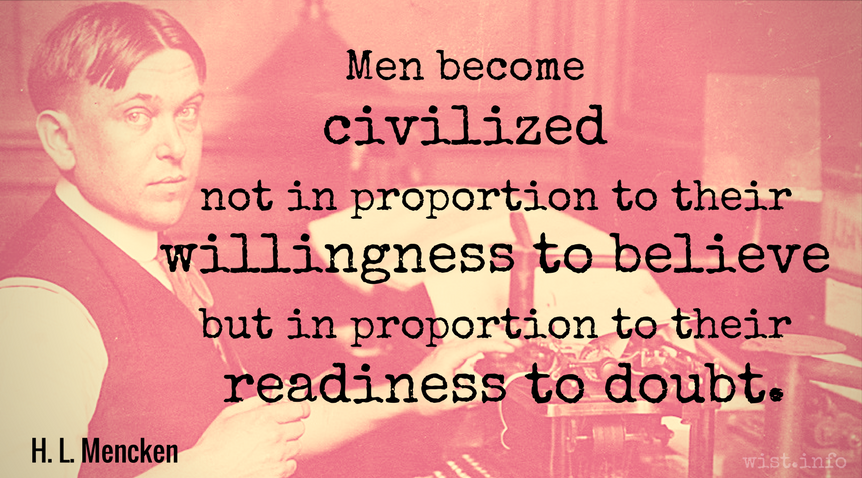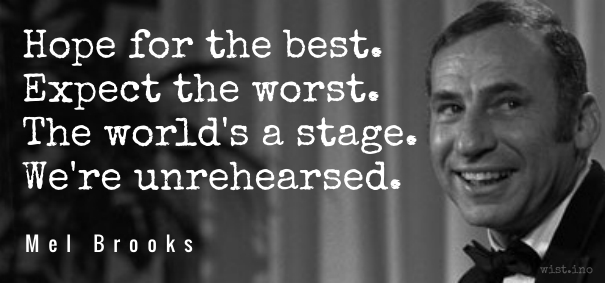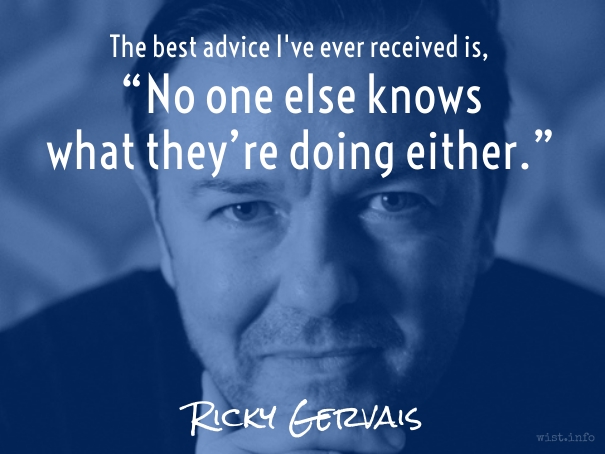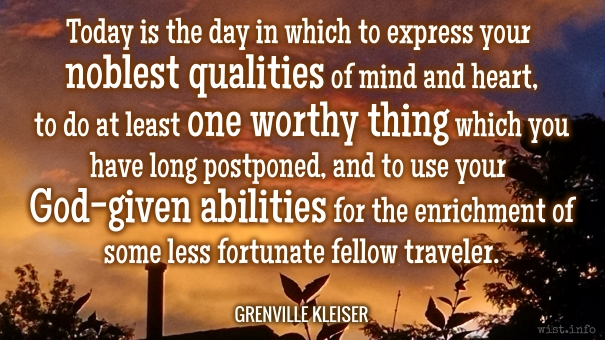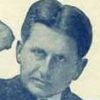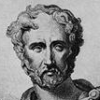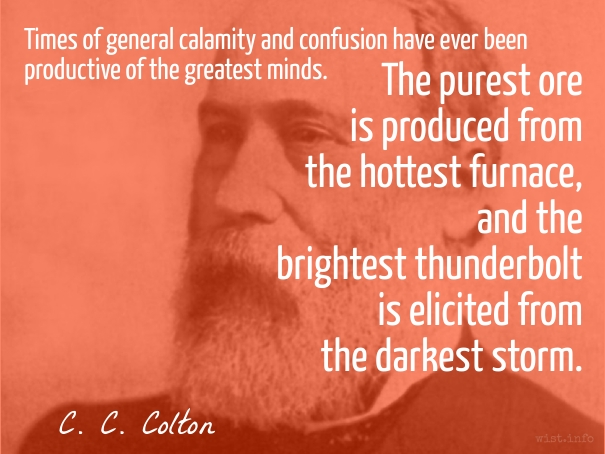If in the following pages I seem to express myself dogmatically, it is only because I find it very boring to qualify every phrase with an ‘I think’ or ‘to my mind.’ Everything I say is merely an Opinion of my own. The reader can take it or leave it. If he has the patience to read what follows he will see that there is only one thing about which I am certain, and this is that there is very little about which one can be certain.
W. Somerset Maugham (1874-1965) English novelist and playwright [William Somerset Maugham]
The Summing Up, ch. 5 (1938)
(Source)
Quotations about:
uncertainty
Note not all quotations have been tagged, so Search may find additional quotes on this topic.
This basic clash of ideas and wills is but one of the forces reshaping our globe — swept as it is by the tides of hope and fear, by crises in the headlines today that become mere footnotes tomorrow. Both the successes and the setbacks of the past year remain on our agenda of unfinished business. For every apparent blessing contains the seeds of danger — every area of trouble gives out a ray of hope — and the one unchangeable certainty is that nothing is certain or unchangeable.
Still you say, the young man has the hope of long life — a hope which the old cannot have. That hope is sheer wishful thinking, for what is more irrational than to count the uncertain as certain, the false as true? But the old man has nothing to look forward to at all. Even so, he is in better sort than the young, for he has obtained what the young only hope for: the young want to live a long life; the old have lived it.
[At sperat adulescens diu se victurum, quod sperare idem senex non potest. Insipienter sperat; quid enim stultius quam incerta pro certis habere, falsa pro veris? At senex ne quod speret quidem habet. At est eo meliore condicione quam adulescens, quoniam id quod ille sperat hic consecutus est: ille volt diu vivere, hic diu vixit.]
Marcus Tullius Cicero (106-43 BC) Roman orator, statesman, philosopher
De Senectute [Cato Maior; On Old Age], ch. 19 / sec. 68 (19.68) (44 BC) [tr. Copley (1967)]
(Source)
(Source (Latin)). Alternate translations:
But ye may saye that the man adolescent & yong hopith that he shall lyve longe & aftir that a man is olde he may not have such an hope. Therfor I answere you that the yong man hopith foliously if by cause of his yong age he wenith to live long, for he is not certayn therof nor knowith not the trouthe. Now ther is nothyng more foly thene is for to have & holde the doubtuose thyngys as certayn & the fals as true & if ye oppose agenst olde age that the olde man hath nothyng in hym whereby he may hope to lyve more, I answere you, Scipion & Lelius, that by this thyng is bettir the condicion & the astate of the olde man than of the yong man, for the yong man will lyve long & the olde man hath lyved long.
[tr. Worcester/Worcester/Scrope (1481)]
But a young man hopeth to live long, which an old man may not look to do. He truly feedeth himself with a vain and a foolish, hope. For what merer folly can there be, than to accompt and repute things which be doubtful and uncertain, for infallible and certain, and things that are false, for true? An old man hath nothing to hope for; but he is therefore in far better state and case than is a young man, for he hath already enjoyed and obtained that, which the young man doth but hope for. The one desireth to live long, the other hath already lived long.
[tr. Newton (1569)]
But the young man hopes to live long, which the old man cannot. He hopes foolishly; for what is greater folly, then to account uncertain things for certain, false for true? The old man hath nothing to hope for more; therefore he is in better state then the former, seeing that what the other wisheth for, he hath obtained already; the young man would live long, the old man hath lived long.
[tr. Austin (1648), ch. 21]
But vigorous Youth may his gay thoughts erect
To many years, which Age must not expect,
But when he sees his airy hopes deceiv'd,
With grief he saies, who this would have believ'd?
We happier are then they, who but desir'd
To possess that, which we long since acquir'd.
[tr. Denham (1669)]
But Youth, you'll say perhaps, may live in Hopes of Length of Days, when we are deprived even of all Hope. A childish Hope this indeed! To hold Uncertainties for Certainties, and Falsity for Truth! Old Age, you say, has not even Hope for its Relief; but, even in that Respect, is it not far preferable to Youth, in being actually possessed of what the other only hopes for? Long Life is sure on the one side, and only wished for on the other.
[tr. Hemming (1716)]
But the young Man is in Hopes of Living long, which the Old cannot. I must tell him he hopes foolishly; for, can there be a greater Instance of Folly than to make sure of Uncertainties; or embrace Falsities for Truth? The Old Man has nothing more to hope for; then he is in a better State than the Young one, since what this hopes for, the other has already attain'd: The one is in Hopes of Living long, the other has done it.
[tr. J. D. (1744)]
It may however be said, perhaps, that Youth has Room at least to hope they have Length of Life before them, which in Old Men would be vain. But foolish is that Hope: For what can be more absurd, than to build on utter Uncertainties, and account on that for sure, which probably may never happen? And to what is alleged, that the Old Man has no Room lest for Hope, I say, Just so much the happier is his Condition, than that of the Young; because he has already attained, and is sure of what the other only wishes and hopes for: The one wishes to live long, the other is at the End of that Wish, he has got it; for he has lived long already.
[tr. Logan (1744)]
It will be replied, perhaps, that "youth may at least entertain the hope of enjoying many additional years; whereas an old man cannot rationally encourage so pleasing an expectation." But is it not a mark of extreme weakness to rely upon precarious contingencies, and to consider an event as absolutely to take place, which is altogether doubtful and uncertain? But admitting that the young may indulge this expectation with the highest reason, still the advantage evidently lies on the side of the old; as the latter is already in possession of that length of life which the former can only hope to attain.
[tr. Melmoth (1773)]
But a young man hopes that he shall live long; which same thing an old man cannot hope. He hopes absurdly. For what is sillier than to hold uncertainties for certainties, the false for true? An old man has not even what he may hope; but he is by that in a better condition than the young man, since that which the former hopes for, the latter has attained. The former wishes to live long; the latter has lived long.
[Cornish Bros. ed. (1847)]
Yet a young man hopes that he will live a long time, which expectation an old man cannot entertain. His hope is but a foolish one: for what can be more foolish than to regard uncertainties as certainties, delusions as truths? An old man indeed has nothing to hope for; yet he is in so much the happier state than a young one; since he has already attained what the other is only hoping for. The one is wishing to live long, the other has lived long.
[tr. Edmonds (1874)]
But, it is said, the young man hopes to live long, while the old man can have no such hope. The hope, at any rate, is unwise; for what is more foolish than to take things uncertain for certain, false for true? Is it urged that the old man has absolutely nothing to hope? For that very reason he is in a better condition than the young man, because what the youth hopes he has already obtained. The one wishes to live long; the other has lived long.
[tr. Peabody (1884)]
Yes, you will say; but a young man expects to live long; an old man cannot expect to do so. Well, he is a fool to expect it. For what can be more foolish than to regard the uncertain as certain, the false as true? "An old man has nothing even to hope." Ah, but it is just there that he is in a better position than a young man, since what the latter only hopes he has obtained. The one wishes to live long; the other has lived long.
[tr. Shuckburgh (1895)]
But you will say the young
Have hope of life, which is to us denied.
A foolish hope. For what more foolish is
Than where no surety is to think things sure,
Where all is doubtful to believe them fixed?
Granted the old man cannot even hope:
'Tis all the better since he has attained
To what the young man only hopes to gain:
The one desires long life, the other's lived.
[tr. Allison (1916)]
But, you may say, the young man hopes that he will live for a long time and this hope the old man cannot have. Such a hope is not wise, for what is more unwise than to mistake uncertainty for certainty, falsehood for truth? They say, also, that the old man has nothing even to hope for. Yet he is in better case than the young man, since what the latter merely hopes for, the former has already attained; the one wishes to live long, the other has lived long.
[tr. Falconer (1923)]
There is a crucial difference between a young man and an old one: the one hopes for a long life yet to come, and the other knows that his time is nearly up. But a hope is only a hope: what is more foolish than to confuse what is uncertain with what is certain, and what is false with what is true? The young man who lives in a state of great expectations is much worse off than the old man who looks forward to nothing. One can only dream of what the other has accomplished: one wants to live a long time, but the other already has.
[tr. Cobbold (2012)]
But, you say, that is not the point. The point is that a young person can reasonably hope to live a long time and an old one cannot. What an unwise hope. I mean, what is more follish than to value uncertainty above certainty? Look at life this way, what the young person only hopes for (and the hope is uncertain, as we have seen), the old person already has. The one hopes to live a long time, the other has already done so.
[tr. Gerberding (2014)]
But they say a young man hopes in a long lease
Of life while an old man awaits its surcease.
Taking certain for uncertain is a wish,
Like taking false for true, completely foolish.
But, they add, even at the end of the rope
An old man is in a better shape than a young man
For he has already fulfilled his life’s hope.
One wants the long life the other had in full measure,
ut dear gods what is “long” in man’s nature?
[tr. Bozzi (2015)]
But you may argue that young people can hope to live a long time, whereas old people cannot. Such hope is not wise, for what is more foolish than to mistake something certain for what is uncertain, or something false for what is true? You might also say8 that an old man has nothing at all to hope for. But he in fact possesses something better than a young person. For what youth longs for, old age has attained. A young person hopes to have a long life, but an old man has already had one.
[tr. Freeman (2016)]
But the young person hopes to live for a long time, a very hope which the old person cannot hold. They hope unwisely for what is more foolish than to take uncertainty for certainty and falsehood for truth. They claim also that the old person has nothing to hope for. But the elderly are in a better place than the young because the young merely hope for what the elderly have obtained and the one wishes to live long, while the other has already done so.
[tr. @sentantiq (2021)]
Every human being, like every animal, wants to live in what is felt to be a safe environment — an environment where you won’t be exposed to unexpected peril. Now, when a man tells you that something you’ve always believed was in fact not true, it gives you a frightful shock and you think, “Oh! I don’t know where I am. When I think I’m planting my foot upon the ground, perhaps I’m not.” And you get into a terror.
Bertrand Russell (1872-1970) English mathematician and philosopher
Interview by Woodrow Wyatt, BBC TV (1959)
On resistance to scientific discovery.
Collected in Bertrand Russell's BBC Interviews (1959) [UK] and Bertrand Russell Speaks His Mind (1960) [US]. Reprinted (abridged) in The Humanist (1982-11/12), and in Russell Society News, #37 (1983-02).
Distrust, and darkness, of a future state,
Make poor Mankind so fearful of their Fate.
Death, in itself, is nothing; but we fear
To be we know not what, we know not where.
I think nobody should be certain of anything. If you’re certain, you’re certainly wrong, because nothing deserves certainty, and so one ought always to hold all one’s beliefs with a certain element of doubt and one ought to be able to act vigorously in spite of the doubt.
Bertrand Russell (1872-1970) English mathematician and philosopher
Interview by Woodrow Wyatt, BBC TV (1959)
(Source)
Collected in Bertrand Russell's BBC Interviews (1959) [UK] and Bertrand Russell Speaks His Mind (1960) [US]. Reprinted (abridged) in The Humanist (1982-11/12), and in Russell Society News, #37 (1983-02).
But what is there in man’s precarious life
To be relied on? o’er the foamy deep
Rides the swift vessel by the wind impell’d:
But as to human fortunes, Time reduces
The great to nothing, and augments the small.Euripides (485?-406? BC) Greek tragic dramatist
Bellerophon [Βελλεροφῶν], frag. 304 (TGF) (c. 430 BC) [tr. Wodhull (1809)]
(Source)
Barnes frag. 117, Musgrave frag. 20. Alternate translations:
Where indeed is there sureness in man's life? For swift ships the winds drive a straight path on the ocean deep, but men's fortunes are changed by the largeness of time, their greatness to nothing, while with increase for the lesser ....
[tr. Collard, Hargreaves, Cropp (1995)]
Where -- where --
for those that die
life’s sure foundation? If we were ships
over the depths of ocean
winds would drive us
straight.
But those that die
their fortune shifts, it veers
in twists of fate -- as Time
(slowly --– slowly) generates itself
at its own leisure
reducing what was great
to nothing – raising up
another ....
[tr. Stevens (2012)]
He who stifles free discussion, secretly doubts whether what he professes to believe is really true.
Wendell Phillips (1811-1884) American abolitionist, orator, social activist
Speech, Daniel O’Connell celebration, Boston (1870-08-06)
(Source)
Heretical views arise when the truth is uncertain, and it is only when the truth is uncertain that censorship is invoked.
Bertrand Russell (1872-1970) English mathematician and philosopher
“The Value of Free Thought” (1944)
(Source)
Try as we will, we cannot honestly recall our youth, for we have lost the feel of its main ingredient: suspense.
Mignon McLaughlin (1913-1983) American journalist and author
The Neurotic’s Notebook, ch. 3 (1963)
(Source)
Even cowards can endure hardship; only the brave can endure suspense.
Mignon McLaughlin (1913-1983) American journalist and author
The Neurotic’s Notebook, ch. 3 (1963)
(Source)
If I valued fame, I should flatter received opinions, which have gathered strength by time, and will yet wear longer than any living works to the contrary. But, for the soul of me, I cannot and will not give the lie to my own thoughts and doubts, come what may. If I am fool, it is, at least, a doubting one; and I envy no one the certainty of his self-approved wisdom.
We can’t be creative if we refuse to be confused. Change always starts with confusion; cherished interpretations must dissolve to make way for what’s new.
Margaret J. "Meg" Wheatley (b. 1944) American writer, teacher, speaker, management consultant
Turning to One Another, “Willing to Be Disturbed” (2002)
(Source)
I am content to be one of the multitude of Christians who do not care much about the doctrine of the Trinity or the historical truth of the gospels. Both as a scientist and as a religious person, I am accustomed to living with uncertainty. Science is exciting because it is full of unsolved mysteries, and religion is exciting for the same reason.
Freeman Dyson (1923-2020) English-American theoretical physicist, mathematician, futurist
“Progress in Religion,” Templeton Prize acceptance speech, Washington National Cathedral (9 May 2000)
(Source)
He is no wise man that will quit a certainty for an uncertainty.
Samuel Johnson (1709-1784) English writer, lexicographer, critic
The Idler, # 57 “The Character of Sophron” (19 May 1759)
(Source)
One of Sophron's (Wisdom's) maxims.
The art of war deals with living and with moral forces. Consequently, it cannot attain the absolute, or certainty; it must always leave a margin for uncertainty, in the greatest things as well as in the smallest. With uncertainty in one scale, courage and self-confidence should be thrown into the other to correct the balance. The greater they are, the greater the margin that can be left for accidents.
[Die Kriegskunst hat es mit lebendigen und mit moralischen Kräften zu thun; daraus folgt, dass sie nirgends das Absolute und Gewisse erreichen kann; es bleibt also überall dem Ungefähr ein Spielraum, und zwar eben so gross bei dem Grössten, wie bei dem Keinsten. Wie dieses Ungefähr auf dereinen Seite steht, muss Muth und Selbstvertrauen auf die andere treten und die Lücke ausfüllen. So gross, wie diese sind, so gross darf der Spielraum für jenes werden.]
Karl von Clausewitz (1780-1831) Prussian soldier, historian, military theorist
On War [Vom Kriege], Book 1, ch. 1 “What Is War? [Was ist der Krieg?],” § 22 (1.1.22) (1832) [tr. Howard & Paret (1976)]
(Source)
(Source (German)). Alternate translations:
The art of war has to deal with living and with moral forces; the consequence of which is that it can never attain the absolute and positive. There is therefore everywhere a margin for the accidental; and just as much inthe greatest things as in the smallest. As there is room for this accidental on the one hand, so on the other there must be courage and self-reliance in proportion to the room left. If these qualities are forthcoming in a high degree, the margin left may likewise be great.
[tr. Graham (1873)]
The art of war has to do with living and with moral forces; from this it follows that it can nowhere attain the absolute and certain; there remains always a margin for the accidental just as much with the greatest things as with the smallest. As on the one side stands this accidental element, so on the other courage and self-confidence must step forward and fill up the gap. The greater the courage and self-confidence, the larger the margin that may be left for the accidental.
[tr. Jolles (1943)]
Look, I tried the cat experiment. On the third trial, the cat was dead. On each of the subsequent 413 trials, it remained dead. Am I doing something wrong?
James Nicoll (b. 1961) Canadian reviewer, editor
Usenet post, “SCHRODINGER’S CAT??” sci.physics (11 Mar 1992)
(Source)
If the mind is to emerge unscathed from this relentless struggle with the unforeseen, two qualities are indispensable: first, an intellect that, even in the darkest hour, retains some glimmerings of the inner light which leads to truth; and second, the courage to follow this faint light wherever it may lead.
[So sind ihm zwei Eigenschaften unentbehrlich: einmal ein Verstand, der auch in dieser gesteigerten Dunkelheit nicht ohne einige Spuren des inneren Lichts ist, die ihn zur Wahrheit führen, und dann Mut, diesem schwachen Lichte zu folgen.]
Karl von Clausewitz (1780-1831) Prussian soldier, historian, military theorist
On War [Vom Kriege], Book 1, ch. 3 “On Military Genius [Der Kriegerische Genius]” (1.3) (1832) [tr. Howard & Paret (1976)]
(Source)
(Source (German)). Alternate translations:
Now, if it is to get safely through this perpetual conflict with the unexpected, two qualities are indispensable: in the first place an understanding which, even in the midst of this intense obscurity, is not without some traces of inner light, which lead to the truth, and then the courage to follow this faint light.
[tr. Graham (1873)]
Now if it is to get safely through this continual conflict with the unexpected, two qualities are indispensable: in the first place, an intellect which even in the midst of this intensified obscurity is not without some traces of inner light which lead to the truth, and next, courage to follow this faint light.
[tr. Jolles (1943)]
Democracy is based on a profound insight into human nature, the realization that all men are sinful, all are imperfect, all are prejudiced, and none knows the whole truth. That is why we need liberty and why we have an obligation to hear all men. Liberty gives us a chance to learn from other people, to become aware of our own limitations, and to correct our bias. Even when we disagree with other people we like to think that they speak from good motives, and while we realize that all men are limited, we do not let ourselves imagine that any man is bad. Democracy is a political system for people who are not sure that they are right.
E. E. Schattschneider (1892-1971) American political scientist [Elmer Eric Schattschneider]
Two Hundred Million Americans in Search of a Government (1969)
(Source)
PROTEUS: Oh, how this spring of love resembleth
The uncertain glory of an April day;
Which now shows all the beauty of the sun,
And by and by a cloud takes all away!
William Shakespeare (1564-1616) English dramatist and poet
Two Gentlemen of Verona, Act 1, sc. 3, l. 85ff (1.3.85-88) (c. 1590)
(Source)
“The choice is yours: to go or wait.”
“And it is also said,” answered Frodo: “Go not to the Elves for counsel, for they will say both no and yes.”
“Is it indeed?” laughed Gildor. “Elves seldom give unguarded advice, for advice is a dangerous gift, even from the wise to the wise, and all courses may run ill.”
J.R.R. Tolkien (1892-1973) English writer, fabulist, philologist, academic [John Ronald Reuel Tolkien]
The Lord of the Rings, Vol. 1: The Fellowship of the Ring, Book 1, ch. 3 “Three Is Company” (1954)
(Source)
“Darkness” is shorthand for anything that scares me — that I want no part of — either because I am sure that I do not have the resources to survive it or because I do not want to find out. The absence of God is in there, along with the fear of dementia and the loss of those nearest and dearest to me. So is the melting of polar ice caps, the suffering of children, and the nagging question of what it will feel like to die. If I had my way, I would eliminate everything from chronic back pain to the fear of the devil from my life and the lives of those I love — if I could just find the right night-lights to leave on.
At least I think I would. The problem is this: when, despite all my best efforts, the lights have gone off in my life (literally or figuratively, take your pick), plunging me into the kind of darkness that turns my knees to water, nonetheless I have not died. The monsters have not dragged me out of bed and taken me back to their lair. The witches have not turned me into a bat. Instead, I have learned things in the dark that I could never have learned in the light, things that have saved my life over and over again, so that there is really only one logical conclusion. I need darkness as much as I need light.
Barbara Brown Taylor (b. 1951) American minister, academic, author
Learning to Walk in the Dark, Introduction (2014)
(Source)
To know all about anything is to know how to deal with it under all circumstances. We feel much happier and more secure when we think we know precisely what to do, no matter what happens, than when we have lost our way and do not know where to turn. And if we have supposed ourselves to know all about anything, and to be capable of doing what is fit in regard to it, we naturally do not like to find that we are really ignorant and powerless, that we have to begin again at the beginning, and try to learn what the thing is and how it is to be dealt with — if indeed anything can be learnt about it. It is the sense of power attached to a sense of knowledge that makes men desirous of believing, and afraid of doubting.
William Kingdon Clifford (1845-1879) English mathematician and philosopher
“The Ethics of Belief,” Part 1 “The Duty of Inquiry,” Lecture, London (11 Apr 1876)
(Source)
Knowledge breeds doubt, not certainty, and the more we know the more uncertain we become.
A. J. P. Taylor (1906-1990) British historian, journalist, broadcaster [Alan John Percivale Taylor]
“What Else Indeed?” New York Review of Books (5 Aug 1965)
(Source)
You’ll “start living tomorrow”? Start living today already, Postumus, you’re running out of time. Anyone with sense started living yesterday.
[Cras vives? hodie iam vivere, Postume, serum est:
Ille sapit, quisquis, Postume, vixit heri.]Martial (AD c.39-c.103) Spanish Roman poet, satirist, epigrammatist [Marcus Valerius Martialis]
Epigrams [Epigrammata], Book 5, epigram 58 (5.58.7-8) (AD 90) [tr. Nisbet (2015)]
(Source)
(Source (Latin)). See a related sentiment by Martial in 1.15. Alternate translations:
Thou'lt live to morrow? -- 'tis too late to day:
Hee's wise who yesterday, I liv'd, can say.
[tr. Sherburne (1651)]
Thou'lt live tomorrow? -- this day's life's too late:
He's wise that lived before the present date.
[tr. Fletcher (1656)]
Tomorrow will I live, the fool does say;
Today itself's too late; the wise lived yesterday.
[tr. Cowley (1668), in Hay, "Appendix," ep. 59]
Today to live, ev'n that's too late I say.
The wiseman, Posthumus, liv'd Yesterday.
[tr. Oldmixon (1728)]
You will live, you say, tomorrow; it is late, Posthumus, to live today; he is wise who lived yesterday.
[tr. Amos (1858), ch. 3, ep. 46, noted as Martial Book 5, ep. 59]
You will live tomorrow: even today it is too late to begin to live. He is the wise man, Postumus, who lived yesterday.
[tr. Bohn's Classical (1859)]
To live today, Postumus, is already too late. He is wise, whoever he be, Postumus, who "lived" yesterday.
[tr. Ker (1919)]
"Tomorrow": -- nay, do not this moment delay.
The wise man is he who has lived yesterday.
[tr. Pott & Wright (1921)]
You'll live tomorrow? Now's too late, I say.
He's wise, my Postumus, who lived yesterday.
[tr. Francis & Tatum (1924), #255]
Yes, this is what wise Martial says,
Though in another way:
"It's much too late today to live!
The wise lived yesterday!"
[tr. Marcellino (1968), "To a Crass Procrastinator"]
"Tomorrow"? -- Postumus, today's too late.
The wise man, Postumus, lived yesterday.
[tr. Whigham (1987)]
Will you live tomorrow? It's already overlate, Postumus, to live today. He is wise, Postumus, who lived yesterday.
[tr. Shackleton Bailey (1993)]
Tomorrow? It’s already too late to live today:
He who lived yesterday, Postumus, he is wise.
[tr. Kline (2006)]
Forget tomorrow's teasing long delay.
To make life pleasant, dwell on yesterday.
[tr. Wills (2007)]
Will you live then? Today is late already.
He's wise who did his living yesterday.
[tr. McLean (2014)]
Believe me, wise men don’t say “I shall live to do that,”
Tomorrow’s life is too late; live today.
At odd and unpredictable times, we cling in fright to the past.
Isaac Asimov (1920-1992) Russian-American author, polymath, biochemist
Foundation’s Edge, Part 1, ch. 1 (1982)
(Source)
The worst part of fear is not knowing what to do. And often you have only to ask What would I do if I were not afraid? to know what to do, and do it, and not be afraid.
James Richardson (b. 1950) American poet
Vectors: Aphorisms and Ten-Second Essays, #121 (2001)
(Source)
The general uncertainty as to what is really happening makes it easier to cling to lunatic beliefs. Since nothing is ever quite proved or disproved, the most unmistakable fact can be impudently denied.
George Orwell (1903-1950) English writer [pseud. of Eric Arthur Blair]
“Notes on Nationalism” (May 1945)
(Source)
To be modern is to exhibit a whole range of uncertainties and pathologies, from Locke’s sense of “uneasiness,” Rousseau’s “amour-propre,” Hegel’s “unhappy consciousness,” and Kierkegaard’s “anxiety,” to Tocqueville’s “inquiétude,” Marx’s “alienation,” and Weber’s “disenchantment.”
Steven B. Smith (b. 1951) American political scientist, academic, author
Modernity and Its Discontents (2016)
(Source)
NOBODY KNOWS ANYTHING. Not one person in the entire motion picture field knows for a certainty what’s going to work. Every time out it’s a guess — and, if you’re lucky, an educated one.
William Goldman (1931-2018) American screenwriter, novelist
Adventures in the Screen Trade, ch. 1 (1983)
(Source)
And the funny thing was that people who weren’t entirely certain they were right always argued much louder than other people, as if the main person they were trying to convince were themselves.
You must have three essentials for the investigation of Chan [Zen]. The first is that you must have the foundation of great faith. The second is that you must have a zealous determination. The third is that you must have the feeling of great doubt. If you omit one of these it is like breaking off the leg of a tripod, which ends up becoming a useless vessel.
高峰云、叅禪須具三要 一有大信根
二有大憤志 三有大疑情 苟闕其一
如折足之鼎 終成廢器。Hyujeong (1520-1604) Korean Seon (Sŏn, Zen) Master [Sosan Taesa, Seosan Daesa, Dae Seonsa]
Mirror of Zen [Samga Gwigam; Samga Kwigom; Seonga Gwigam], ch. 14 [tr. Jorgensen (2012)]
(Source)
Alternate translations:
For the study of Seon, there are three requirements: (1) having the great root of faith; (2) having great determination, and (3) having great doubt. If you lack one of these, it is like a broken like on a tripod sacrificial vessel. In the end you will discard it.
[tr. Miller (2017)]
There are three essentials to Sŏn meditation. First of all, you must be rooted in Great Faith and Great Confidence. Secondly, one must have Great Anger -- a strong, inwardly-directed, ardent determination to practice. Thirdly, one must have Great Doubt. If one of these is missing, it is like a tripod vessel with one leg cut off -- in the end, it will be of no use.
[Source]
It is well known that Ganhwaseon practitioners must have three things of essential importance: The first is a Foundation of Great Faith (大信根) for the practice which is possible; the second is Great Zealous Determination (大憤志) of practice to attain enlightenment; the third is a Great Feeling of Doubt (大疑情) on the Hwadu. If one of these is lacking, then it is like a tripod pot with a broken foot and is useless.
[Source]
If everybody always lies to you, the consequence is not that you believe the lies, but rather that nobody believes anything any longer. This is because lies, by their very nature, have to be changed, and a lying government has constantly to rewrite its own history. On the receiving end you get not only one lie — a lie which you could go on for the rest of your days — but you get a great number of lies, depending on how the political wind blows. And a people that no longer can believe anything cannot make up its mind. It is deprived not only of its capacity to act but also of its capacity to think and to judge. And with such a people you can then do what you please.
Hannah Arendt (1906-1975) German-American philosopher, political theorist
Interview with Roger Errera (Oct 1973), The New York Review of Books (26 Oct 1978)
(Source)
There are inquiries in which scanty evidence is worth using. We may not be able to get certainty, but we can get probability, and half a loaf is better than no bread.
C. S. Lewis (1898-1963) English writer, literary scholar, lay theologian [Clive Staples Lewis]
“Historicism,” The Month (1950-10)
(Source)
Regarding historical inquiry based on incomplete evidence. First reprinted in Christian Reflections (1967).
Man must accept the responsibility for himself and the fact that only by using his own powers can he give meaning to his life. But meaning does not imply certainty; indeed, the quest for certainty blocks the search for meaning. Uncertainty is the very condition to impel a man to unfold his powers. If he faces the truth without panic, he will recognize that there is no meaning to life except the meaning man gives his life by the unfolding of his powers, by living productively.
Erich Fromm (1900-1980) American psychoanalyst and social philosopher
Man for Himself, ch. 3 (1947)
(Source)
ALCESTE: Doubts are more cruel than the worst of truths.
[Les doutes sont fâcheux plus que toute autre chose.]
Molière (1622-1673) French playwright, actor [stage name for Jean-Baptiste Poquelin]
Le Misanthrope, Act 3, sc. 5, l. 1122 (1666) [tr. Wormeley]
Alt. trans.: "Doubts are more torturing than any truth." [tr. Page]
A babe is nothing but a bundle of possibilities.
Henry Ward Beecher (1813-1887) American clergyman and orator
Proverbs from Plymouth Pulpit, “Children” (1887) [ed. William Drysdale]
(Source)
So we have to make guesses in order to give any utility at all to science. In order to avoid simply describing experiments that have been done, we have to propose laws beyond their observed range. There is nothing wrong with that, despite the fact that it makes science uncertain. If you thought before that science was certain — well, that is just an error on your part.
Richard Feynman (1918-1988) American physicist
The Character of Physical Law, ch. 3 “The Great Conservation Principles” (1965)
(Source)
Warped with satisfactions and terrors, woofed with too many ambiguities and too few certainties, life can be lived best not when we have the answers — because we will never have those — but when we know enough to live it right out to the edges, edges sometimes marked by other people, sometimes showing only our own footprints.
Ah, what a dusty answer gets the soul
When hot for certainties in this our life!
Men become civilized not in proportion to their willingness to believe but in proportion to their readiness to doubt.
H. L. Mencken (1880-1956) American writer and journalist [Henry Lewis Mencken]
“What I Believe,” sec. 4, Forum and Century (Sep 1930)
(Source)
The ignorance of even the best-informed investor about the more remote future is much greater than his knowledge, and he cannot but be influenced to a degree which would seem wildly disproportionate to anyone who really knew the future, and be forced to seek a clue mainly here to trends further ahead. But if this is true of the best-informed, the vast majority of those who are concerned with the buying and selling of securities know almost nothing whatever about what they are doing. They do not possess even the rudiments of what is required for a valid judgement, and are the prey of hopes and fears easily aroused by transient events and as easily dispelled.
God offers to every mind its choice between truth and repose. Take which you please — you can never have both.
Ralph Waldo Emerson (1803-1882) American essayist, lecturer, poet
“Intellect,” Essays: First Series (1841)
(Source)
The best advice I’ve ever received is, “No one else knows what they’re doing either.”
There are many fine things which you mean to do some day, under what you think will be more favorable circumstances. But the only time that is surely yours is the present, hence this is the time to speak the word of appreciation and sympathy, to do the generous deed, to forgive the fault of a thoughtless friend, to sacrifice self a little more for others. Today is the day in which to express your noblest qualities of mind and heart, to do at least one worthy thing which you have long postponed, and to use your God-given abilities for the enrichment of some less fortunate fellow traveler. Today you can make your life big, broad, significant and worthwhile. The present is yours to do with it as you will.
Times of general calamity and confusion have ever been productive of the greatest minds. The purest ore is produced from the hottest furnace, and the brightest thunderbolt is elicited from the darkest storm.
Charles Caleb "C. C." Colton (1780-1832) English cleric, writer, aphorist
Lacon: Or, Many Things in Few Words, Vol. 1, § 28 (1820)
(Source)
I’m not really rich. I’m something far more noble I’m a job creator. [Heavenly chorus] Sort of the same way Patagonian tooth-fish became Chilean sea-bass. [Heavenly chorus] But y’know what, just by suggesting, just by bringing it up, that he is going to tax me more, Comrade Obama has created an atmosphere of uncertainty that makes me skittish about creating more jobs, yeah, I have been so freaked out that today at breakfast I could barely butter my gold. You see, you poor people, you don’t get how much “uncertainty” gives us job creators the willies. It’s terrifying — like when you find out your private island has natives; or when your wife notices the maid’s kid looks just like you; or when the limo driver tries to start a conversation. So tax me at a higher rate if you like, you’re practically firing yourselves. Because I’ll tell you something, I have been so shitting in my pants about this uncertainty thing, that yesterday I let go a dozen essential workers at my compound, including my Tivo programmer, my manscaper, the liposuctionist, my gardener’s personal trainer, my dog whisperer, the lookalike I hired to foil assassination attempts, my private farmer, the lady who dispenses hand sanitizer after our pre-show prayer circle, the girl I pay to mistake me for Jon Hamm, and the guy who takes care of the shark tank. Which reminds me, I’m gonna have to let go two sharks!
Look, I tried the cat experiment. On the third trial, the cat was dead. On each of the subsequent 413 trials, it remained dead. Am I doing something wrong?
James Nicoll (b. 1961) Canadian reviewer, editor
“SCHRODINGER’S CAT??” sci.physics, Usenet (11 Mar 1992)
(Source)







